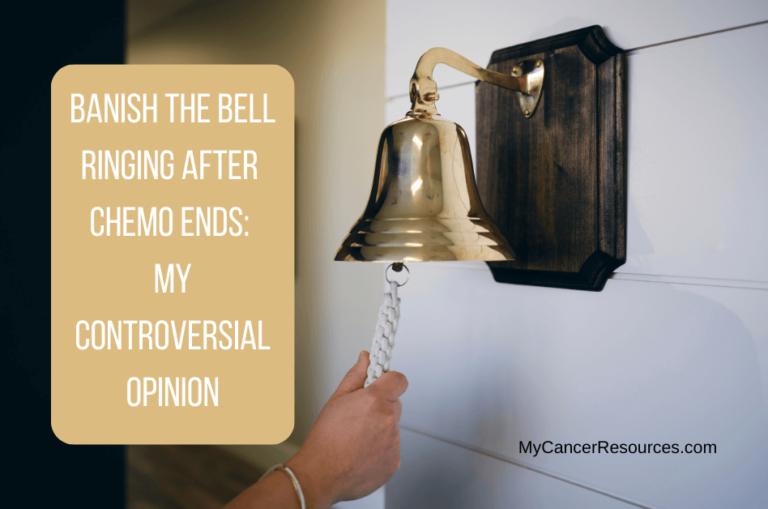
Yep, I said it out loud – I vote to end the tradition of ringing the bell when cancer treatment is done! I know this is a controversial opinion, but hear me out….
For those that don’t know, there is a tradition in hospitals and clinics around the world where on the last day of chemo or radiation treatment, when the treatment is over, the person rings a bell that is attached to the wall in a prominent place in the treatment area.
This is an important milestone for sure, and I am NOT saying that finishing up a grueling treatment shouldn’t be recognized and celebrated, but not by ringing a bell.
The tradition of ringing a bell when cancer treatment ends is thought to have started at MD Anderson Cancer Center in Houston, Texas in 1996. The story is that a retired Navy Rear Admiral told his oncologist that once his chemotherapy ended, he was going to follow the Navy tradition of ringing a bell to signify “when a job was done”. He brought a brass bell to his last treatment and rang it multiple times. He donated the bell to the cancer center, where it was mounted on the wall for others to ring.
After that, word spread, and bells started springing up in clinics and hospitals. Thousands of patients have rung the bell to mark the end of treatment. For some, it is a low-key event, while others bring their entire support system and have a big celebration.
Benefits and Drawbacks
One Canadian study found that ringing the bell provides inspiration and hope for current patients and gives those ringing the bell a sense of control during what has often been a journey of feeling out of control.
However, ringing the bell isn’t always a positive experience. Another study found that patients that rang the bell tended to remember their treatment more negatively and this distress got worse in the months following the end of treatment when compared to those who finished without ringing a bell.
Events or situations that are connected with a strong feeling (like excitement, joy, relief, or accomplishment) can be ‘locked’ into the brain with intense memories versus moments that are less intense emotionally.
These results surprised the researchers, because their hypothesis was that the bell was meant to signal joy and serve as encouragement for others undergoing treatment.
Instead, they realized hearing the bell can upset those still in treatment, and for those ringing the bell, it can lock in the stress of treatment into their memories and can also create false hope.
Some associate the ringing of the bell to mean they are cured, and their treatments are over for good. If the cancer returns, the memory of ringing the bell can also turn negative. Many cancers recur, or new cancers can develop.
I’m concerned that the way the bell is presented can lead to expectations of complete cure, forever, and unfortunately, for some, this simply isn’t the case.
Why I Think The Bell Tradition Should Stop (Or at Least Changed)
Ok, so ‘ban’ is probably too harsh of a word. But my opinion that the tradition should stop or change has more to do with the message that ringing a bell sends.
A mom I worked with had a son whose retinoblastoma (tumor in the retina of the eye) required that his eye be removed. She said “It’s so unfair that he won’t get to ring a bell because his treatment was surgery. But that doesn’t mean he didn’t suffer – it just looks different than the suffering of a kid receiving chemo.”
Dr. Kevin Gale wrote about his mom’s experience hearing the bell while she was receiving treatment for metastatic colon cancer. She was sad, knowing that she wouldn’t be able to ring that bell since her treatment would be ongoing.
People with metastatic disease sit in the same treatment rooms week after week with others who get to ring that bell. Each time the bell is heard, it can chip away at them, mentally and emotionally. That simply isn’t fair.
My opinion is also personal. My mother-in-law suffered for years through multiple surgeries, radiation, chemotherapy and immunotherapy. Since the chemotherapy didn’t make a dent in her tumors, her treatment changed, and her full course of chemo wasn’t completed (which I agree with – there’s no sense in continuing a course of treatment that clearly isn’t working).
Since she didn’t ‘finish treatment’ and entered hospice, there was no bell to ring. But does that mean she fought any less valiantly than others and didn’t deserve to have her efforts recognized? I don’t believe so.
My Proposal
There are a few ways this tradition could be changed. I do think it is important to recognize milestones like completing treatment, and I don’t want to minimize the celebration for those people. Here are my thoughts:
- For clinics that want to keep the bell, move it to a private room. Having it in the middle of the treatment room where others witness celebrations that they won’t be part of can be psychologically and emotionally devastating. Keep the celebration, but in a private space away from those still in treatment.
- Clarify the purpose of the bell to new patients at the beginning of treatment. This gives them something to look forward to, but also eliminates misunderstandings about what the bell means (that they’re done with cancer treatments forever). The Hospital at the University of Pennsylvania emphasizes that anyone can ring the bell at any time, not just to celebrate the end of treatment.
So if someone wants to celebrate good news, to rally at the beginning of a treatment cycle, or if they simply want to spark joy and hope, they can ring the bell. This is a much more inclusive program that allows everyone to participate. - Change the program. Follow the lead of places like the Fred Hutch/University of Washington Cancer Consortium or Straub Cancer Center in Honolulu, Hawaii that have staff sign a card or provide a certificate of completion or small gift to celebrate the end of treatment.
This still recognizes the accomplishment of finishing treatment but in a more subtle way. The ceremony of presenting these items can also be done in a private room to focus completely on the person and not those still receiving treatment.
Final Thoughts
Finishing chemotherapy or radiation is something to be excited about and celebrated, because it can be a long, difficult process with many side effects to deal with.
But let’s change how the concept of ringing a bell is presented to new patients and move the bell out of sight and earshot of those still receiving treatment.
Even better, change the program to provide something tangible the person can take with them as a daily reminder of their accomplishment and the people who helped them reach that milestone.
I’m truly interested in hearing your thoughts. Please share them in the comments below!



